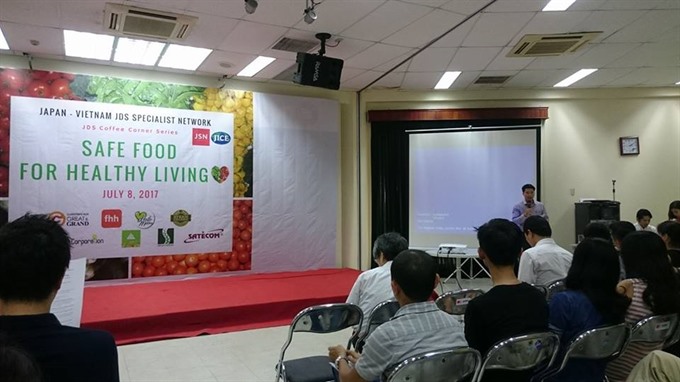 Society
Society

Vietnamese farmers continue to face difficulties while practicing recognised farming standards for safe products, such as VietGap and GlobalGap. Customers, meanwhile, have no option but to select food wisely for their families’ healthy living, Vietnamese and Japanese agricultural experts have said.
 |
| Vietnamese and Japanese agriculture experts share opinions at the workshop “Safe food for healthy living - What we learn from Japan and progress in Việt Nam”. — VNS Photo Hong Minh |
HÀ NỘI — Vietnamese farmers continue to face difficulties while practicing recognised farming standards for safe products, such as VietGap and GlobalGap.
Customers, meanwhile, have no option but to select food wisely for their families’ healthy living, Vietnamese and Japanese agricultural experts have said.
Experts from Việt Nam and Japan shared their opinions and experiences in promoting and using safe food from both countries at a workshop titled “Safe food for healthy living - What we learn from Japan and progress in Việt Nam,” organised by the Japan International Cooperation Centre (JICE) and JDS Specialists Network in Hà Nội on Saturday.
Speaking at the workshop, Teruyoshi Kumashiro, an agriculture expert from the Japan International Cooperation Agency (JICA), said the habit of recording farming practice by farmers and the slack connection between good producers and buyers remain the top challenges for the success of improving the reliability of safe crop production in the northern region of Việt Nam.
Kumashiro, who is the chief advisor of an ongoing project on improving the reliability of safe crop production in the northern region of Việt Nam, said surveys showed that farmers in Việt Nam were not efficient in making frequent records of their farming practice, such as when the crops are cultivated, when to use plant protection chemicals and when the crops are safe for harvest.
Research from the project also showed that joint sales of crops by farmers’ groups and ensuring the reliability of safe crops among stakeholders were also challenges to promoting safe crops, he said.
“The project aims to improve agricultural products in two cities and 11 provinces in the north of Việt Nam in terms of safety and reliability and in the long run will promote safe crop production, including safe vegetables at target sites,” Kumashiro said.
According to Kumashiro, in 2008, the agriculture ministry in Việt Nam established a technical standard called VietGAP. However, Viet GAP includes indirect items with cultivation methods and costs a certain amount of money to acquire certification; therefore low-income producers have not been able to apply this standard because it was too strict.
With JICA’s support for the safe crop project since 2010, the project eventually developed BasicGAP for Việt Nam, which extracted 26 important criteria and introduced a self-recording system, Kumashiro said.
BasicGAP was officially approved by MARD in 2014.
Nguyễn Công Thành, deputy head of the Sciences and International Co-operation Division under MARD’s Plant Protection Research Institute, said both VietGap and BasicGap are being applied in Việt Nam and both are good to ensure the safety and quality of agriculture products.
He agreed with the Japanese expert that not all Vietnamese farmers know how to practice VietGap or BasicGap on their crops.
Phí Công Nguyên, an agriculture expert from MARD’s Agricultural Genetics Institute, said even though farmers in Việt Nam stand at the base of the value chain and play the primary role in the value chain, what they get from the value chain is the least.
“One of the reasons is because not all farmers have good knowledge or are well trained in practical production,” he said, adding that slack cooperation among farmers and lack of good support policies from the Government were also to blame.
“Farmers need investment and technology to catch up with consumers’ requirement for safe food in Việt Nam,” Nguyên said.
Participants at the workshop, including safe food distributors and farmers, also shared their experiences.
Vũ Thái Trường, a national technical specialist from UNDP Việt Nam, said the workshop is the first event under the JDS Coffee Corner series, held by JDS alumni who studied in Japan under the Japanese government’s scholarship for human resources development and have returned to contribute to the development of Việt Nam.
All JDS Coffee Corner events aim to leverage the knowledge and expertise of specialists in the network, in particular, and society, in general, to address current serious social and economic issues in Việt Nam, Trường said. — VNS




